安徽省2021年中考英语语法专题突破十情态动词课件(共28张PPT)
文档属性
| 名称 | 安徽省2021年中考英语语法专题突破十情态动词课件(共28张PPT) |

|
|
| 格式 | zip | ||
| 文件大小 | 886.7KB | ||
| 资源类型 | 教案 | ||
| 版本资源 | 通用版 | ||
| 科目 | 英语 | ||
| 更新时间 | 2021-01-03 13:11:08 | ||
图片预览

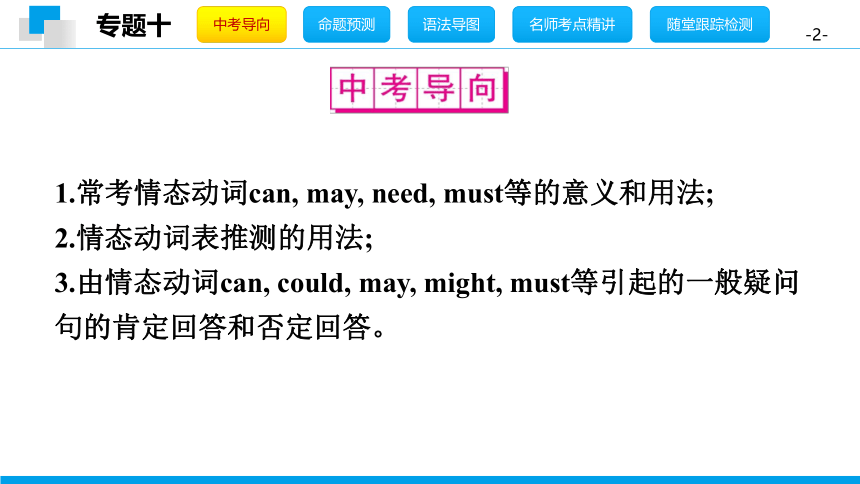

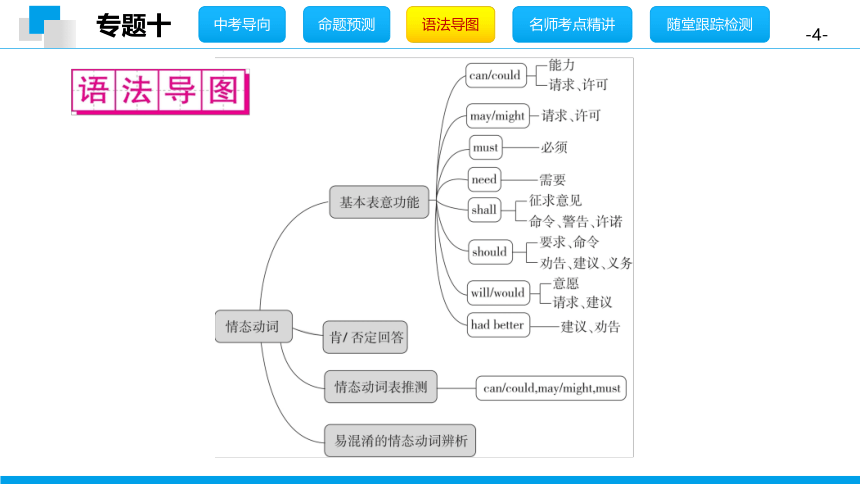
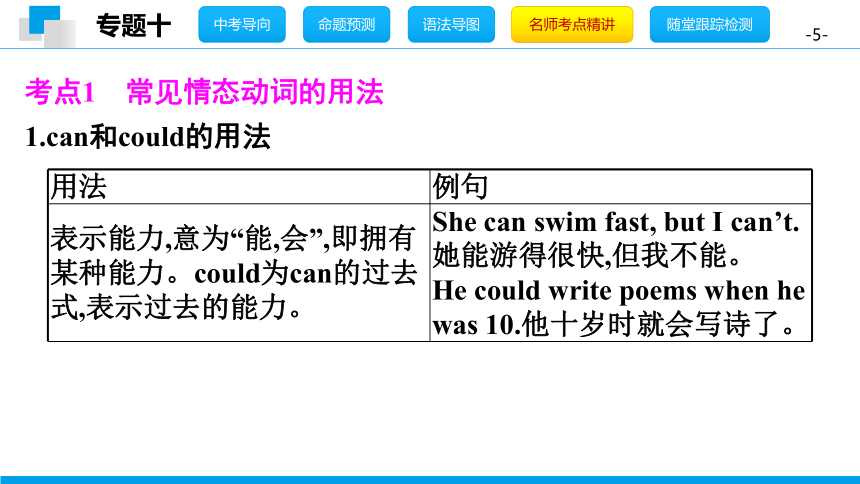
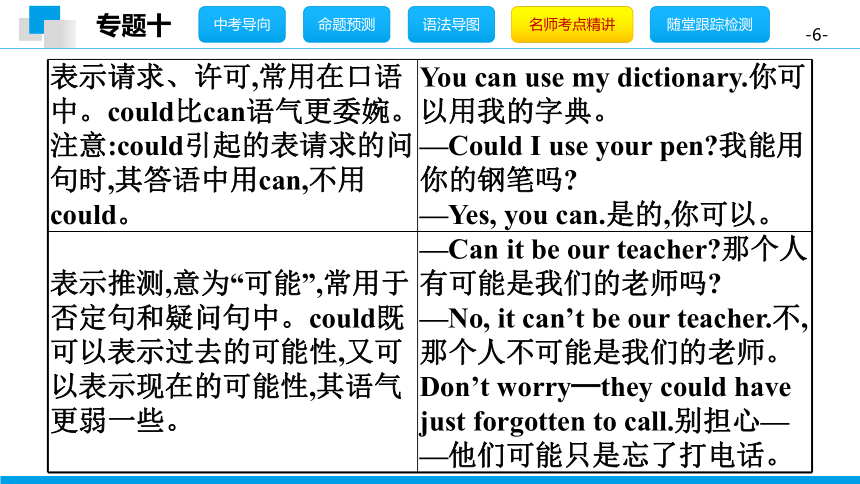
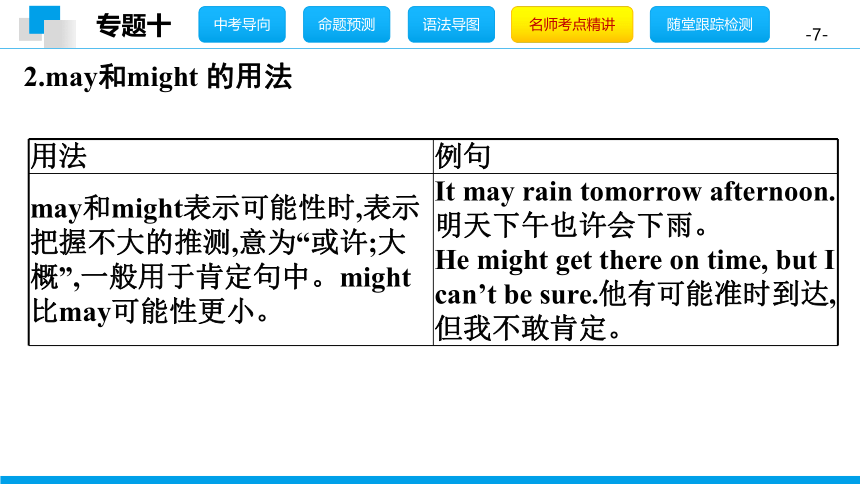
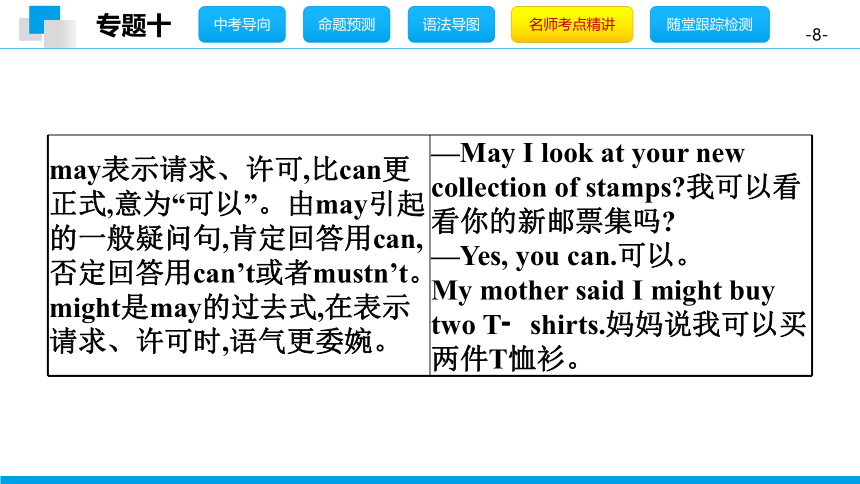
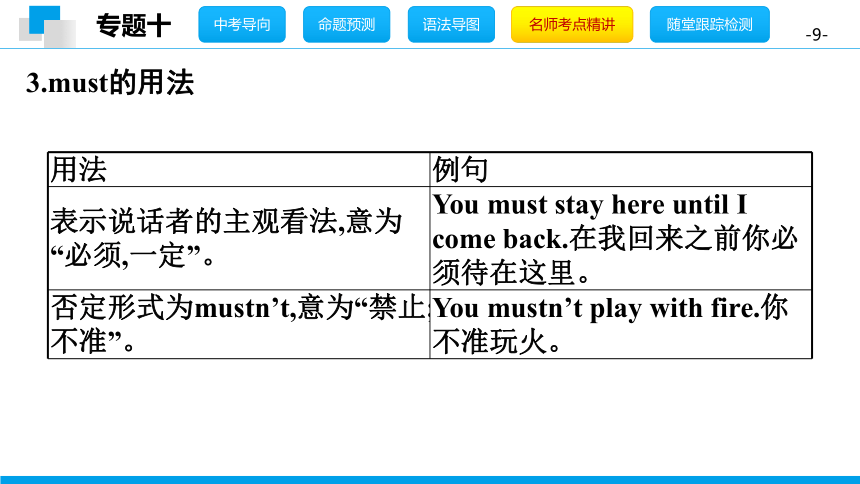
文档简介
(共28张PPT)
专题十 情态动词
1.常考情态动词can,
may,
need,
must等的意义和用法;
2.情态动词表推测的用法;
3.由情态动词can,
could,
may,
might,
must等引起的一般疑问句的肯定回答和否定回答。
情态动词是安徽中考的常考点之一,最有可能以单项填空的形式出现。考生在解答此类题时,一定要掌握每个情态动词的含义,并能结合具体的语境进行判断,选出正确答案。
?
考点1 常见情态动词的用法
1.can和could的用法
用法
例句
表示能力,意为“能,会”,即拥有某种能力。could为can的过去式,表示过去的能力。
She
can
swim
fast,
but
I
can’t.她能游得很快,但我不能。
He
could
write
poems
when
he
was
10.他十岁时就会写诗了。
表示请求、许可,常用在口语中。could比can语气更委婉。注意:could引起的表请求的问句时,其答语中用can,不用could。
You
can
use
my
dictionary.你可以用我的字典。
—Could
I
use
your
pen?我能用你的钢笔吗?
—Yes,
you
can.是的,你可以。
表示推测,意为“可能”,常用于否定句和疑问句中。could既可以表示过去的可能性,又可以表示现在的可能性,其语气更弱一些。
—Can
it
be
our
teacher?那个人有可能是我们的老师吗?
—No,
it
can’t
be
our
teacher.不,那个人不可能是我们的老师。
Don’t
worry─they
could
have
just
forgotten
to
call.别担心——他们可能只是忘了打电话。
2.may和might
的用法
用法
例句
may和might表示可能性时,表示把握不大的推测,意为“或许;大概”,一般用于肯定句中。might比may可能性更小。
It
may
rain
tomorrow
afternoon.明天下午也许会下雨。
He
might
get
there
on
time,
but
I
can’t
be
sure.他有可能准时到达,但我不敢肯定。
may表示请求、许可,比can更正式,意为“可以”。由may引起的一般疑问句,肯定回答用can,否定回答用can’t或者mustn’t。
might是may的过去式,在表示请求、许可时,语气更委婉。
—May
I
look
at
your
new
collection
of
stamps?我可以看看你的新邮票集吗?
—Yes,
you
can.可以。
My
mother
said
I
might
buy
two
T?shirts.妈妈说我可以买两件T恤衫。
3.must的用法
用法
例句
表示说话者的主观看法,意为“必须,一定”。
You
must
stay
here
until
I
come
back.在我回来之前你必须待在这里。
否定形式为mustn’t,意为“禁止;不准”。
You
mustn’t
play
with
fire.你不准玩火。
由must引起的一般疑问句,肯定回答用must,否定回答用needn’t或don’t
have
to。
—Must
I
finish
my
homework
now?我现在必须完成家庭作业吗?
—No,
you
needn’t/don’t
have
to.不,你不必。
表示把握较大的推测,意为“一定;准是”,只用于肯定句中。
The
light
is
on,
so
he
must
be
at
home
now.灯亮着,所以他现在肯定在家。
4.need的用法
用法
例句
用作情态动词时,后面接动词原形,意为“必须;必要;需要”,通常用于疑问句和否定句中。由need引起的一般疑问句,肯定回答用must或have
to,否定回答用needn’t或don’t
have
to。
—Need
I
take
any
food
and
drinks?需要我带一些吃的和喝的吗?
—Yes,
you
must/have
to.是的,你必须带。
用作实义动词时,有时态、人称和数的变化。当主语是人时,后面可以接sth.或to
do
sth.;当主语是物时,后面可以接V?ing
形式和动词不定式的被动结构(need
doing=need
to
be
done)。
You
need
to
put
away
your
school
things
at
once.你需要立刻把你的学习用品收起来。
My
new
watch
needs
repairing.=My
new
watch
needs
to
be
repaired.我的新手表需要修理一下。
5.shall的用法
用法
例句
用于第一人称,代替will用于一般将来时。
We
shall
have
a
class
meeting
sometime
next
week.我们将于下周某个时间开一次班会。
用于第一人称作主语的一般疑问句中,表示征求对方意见,也可用于第三人称。
—Shall
we
go
out
for
a
walk
after
supper?晚饭后我们一起去散步好不好?
—Good
idea.好主意。
用于第二、三人称作主语的陈述句中,表示说话人给对方的命令、警告、许诺等。
You
shall
fail
the
exam
if
you
don’t
study
hard.如果你不努力学习的话,你考试一定会失败。
6.should的用法
should意为“应该”,可表示要求和命令,也可以表示劝告、建议、义务、责任等。例如:
We
should
protect
the
environment.我们应该保护环境。
7.will和would的用法
(1)will表示自愿做某事或主动提出做某事,如意愿、意志、打算等,可用于多种人称。would是will的过去式。例如:
I
will
help
you
if
I’m
free
this
afternoon.今天下午如果我有空,我就会帮你。
(2)表示请求、建议,常用于第二人称作主语的疑问句中。would比will语气更委婉。例如:
Would
you
please
do
me
a
favor?你可以帮我一个忙吗?
8.had
better的用法
had
better表示建议或劝告,意为“最好”,没有人称和数的变化,后面接不带to的不定式,即动词原形,其否定形式为had
better
not。例如:
You
had
better
not
give
the
book
to
him.你最好不要把这本书给他。
考点2 易混淆的情态动词辨析
1.can和may
用法
例句
can和may均可用来表示征求意见或许可,意为“可以”,一般情况下两者可互换,但may较为正式,can多用于口语中。
Can/May
I
help
you?我能帮助你吗?
can和may表示可能性时,在肯定句中用may,在疑问句中用can,在否定句中用can’t。
She
may
be
in
the
classroom.她可能在教室里。
Where
can
they
be
now?他们现在可能在哪里?
That
can’t
be
true.那不可能是真的。
2.can’t和mustn’t
情态动词
用法
例句
can’t
意为“不会,不能”,或在否定句中表示推测,意为“不可能”。
I
can’t
eat
any
more.I’m
full
up.我不能再吃了。我已经很饱了。
The
man
can’t
be
Peter
because
he
is
much
younger
than
Peter.那个人不可能是彼得,因为他比彼得年轻得多。
mustn’t
意为“禁止,不许”,用来表达命令,语气强烈。
You
mustn’t
play
football
in
the
street.
It’s
too
dangerous.你不许在街上踢足球。这样太危险了。
单项填空
1.—Can
I
pay
the
bill
by
WeChat?
—Sorry,
sir.
But
it
is
the
management
rules
of
our
hotel
that
payment
be
made
in
cash.(
C
)?
A.can
B.will
C.shall
D.may
2.—Could
I
look
at
your
pictures?
—Yes,
of
course
you .(
B
)?
A.could
B.can
C.will
D.might
3.—Where
are
you
going
for
your
summer
holiday?
—I go
to
Dalian.
I
haven’t
decided.(
B
)?
A.need
B.may
C.must
D.mustn’t
4.—Let’s
go
climbing,
shall
we?
—You be
joking!
Don’t
you
know
I’m
afraid
of
high
places?(
C
)?
A.may
B.can
C.must
D.should
5.—Listen!
Is
that
Millie
playing
the
violin
in
the
art
room?
—No,
it be
her.
She
has
gone
to
the
teachers’
office.
(
D
)?
A.may
not
B.mustn’t
C.needn’t
D.can’t
6.I
go
now,
or
I’ll
miss
my
football
class.(
C
)?
A.can
B.might
C.must
D.could
7.—Hey,
you
come
over?
We
have
a
seat
here.?
—Thank
you.
I
have
my
own
seat.
I
just
want
to
enjoy
the
views
through
the
window.(
A
)
A.Would
B.Shall
C.Must
D.May
8.We be
more
careful,
or
we
will
make
the
same
mistake
in
the
test.(
D
)?
A.might
B.can
C.may
D.should
9.—Must
we
clean
the
room
at
once?
—No,you .You
can
do
it
after
school.(
B
)?
A.mustn’t
B.needn’t
C.can’t
D.mightn’t
10.—I’d
like
a
pet,but
I
am
busy
all
day.
—Goldfish
are
a
good
choice.
You feed
them
every
day.(
D
)?
A.mustn’t
B.can’t
C.shouldn’t
D.needn’t
11.I
thought
you
like
something
to
read,
so
I
have
brought
you
some
books.(
B
)?
A.ought
B.might
C.could
D.must
12.—Are
you
interested
in
shopping
online?
—Not
so
much.
We see
real
products
but
pictures.
(
B
)?
A.shouldn’t
B.can’t
C.mustn’t
D.needn’t
13.—May
I
take
this
magazine
out
of
the
reading
room?
—No,
you .You
can
read
it
here.(
D
)?
A.mightn’t
B.won’t
C.needn’t
D.mustn’t
14.—Whose
is
the
dictionary?
—It be
Alice’s.
Look
at
her
name
on
the
cover.
(
C
)?
A.may
B.can
C.must
D.will
15.—Life
gets
easier
with
the
Internet.
—That’s
true!
Almost
everything be
done
online.
(
A
)?
A.can
B.need
C.must
D.should
专题十 情态动词
1.常考情态动词can,
may,
need,
must等的意义和用法;
2.情态动词表推测的用法;
3.由情态动词can,
could,
may,
might,
must等引起的一般疑问句的肯定回答和否定回答。
情态动词是安徽中考的常考点之一,最有可能以单项填空的形式出现。考生在解答此类题时,一定要掌握每个情态动词的含义,并能结合具体的语境进行判断,选出正确答案。
?
考点1 常见情态动词的用法
1.can和could的用法
用法
例句
表示能力,意为“能,会”,即拥有某种能力。could为can的过去式,表示过去的能力。
She
can
swim
fast,
but
I
can’t.她能游得很快,但我不能。
He
could
write
poems
when
he
was
10.他十岁时就会写诗了。
表示请求、许可,常用在口语中。could比can语气更委婉。注意:could引起的表请求的问句时,其答语中用can,不用could。
You
can
use
my
dictionary.你可以用我的字典。
—Could
I
use
your
pen?我能用你的钢笔吗?
—Yes,
you
can.是的,你可以。
表示推测,意为“可能”,常用于否定句和疑问句中。could既可以表示过去的可能性,又可以表示现在的可能性,其语气更弱一些。
—Can
it
be
our
teacher?那个人有可能是我们的老师吗?
—No,
it
can’t
be
our
teacher.不,那个人不可能是我们的老师。
Don’t
worry─they
could
have
just
forgotten
to
call.别担心——他们可能只是忘了打电话。
2.may和might
的用法
用法
例句
may和might表示可能性时,表示把握不大的推测,意为“或许;大概”,一般用于肯定句中。might比may可能性更小。
It
may
rain
tomorrow
afternoon.明天下午也许会下雨。
He
might
get
there
on
time,
but
I
can’t
be
sure.他有可能准时到达,但我不敢肯定。
may表示请求、许可,比can更正式,意为“可以”。由may引起的一般疑问句,肯定回答用can,否定回答用can’t或者mustn’t。
might是may的过去式,在表示请求、许可时,语气更委婉。
—May
I
look
at
your
new
collection
of
stamps?我可以看看你的新邮票集吗?
—Yes,
you
can.可以。
My
mother
said
I
might
buy
two
T?shirts.妈妈说我可以买两件T恤衫。
3.must的用法
用法
例句
表示说话者的主观看法,意为“必须,一定”。
You
must
stay
here
until
I
come
back.在我回来之前你必须待在这里。
否定形式为mustn’t,意为“禁止;不准”。
You
mustn’t
play
with
fire.你不准玩火。
由must引起的一般疑问句,肯定回答用must,否定回答用needn’t或don’t
have
to。
—Must
I
finish
my
homework
now?我现在必须完成家庭作业吗?
—No,
you
needn’t/don’t
have
to.不,你不必。
表示把握较大的推测,意为“一定;准是”,只用于肯定句中。
The
light
is
on,
so
he
must
be
at
home
now.灯亮着,所以他现在肯定在家。
4.need的用法
用法
例句
用作情态动词时,后面接动词原形,意为“必须;必要;需要”,通常用于疑问句和否定句中。由need引起的一般疑问句,肯定回答用must或have
to,否定回答用needn’t或don’t
have
to。
—Need
I
take
any
food
and
drinks?需要我带一些吃的和喝的吗?
—Yes,
you
must/have
to.是的,你必须带。
用作实义动词时,有时态、人称和数的变化。当主语是人时,后面可以接sth.或to
do
sth.;当主语是物时,后面可以接V?ing
形式和动词不定式的被动结构(need
doing=need
to
be
done)。
You
need
to
put
away
your
school
things
at
once.你需要立刻把你的学习用品收起来。
My
new
watch
needs
repairing.=My
new
watch
needs
to
be
repaired.我的新手表需要修理一下。
5.shall的用法
用法
例句
用于第一人称,代替will用于一般将来时。
We
shall
have
a
class
meeting
sometime
next
week.我们将于下周某个时间开一次班会。
用于第一人称作主语的一般疑问句中,表示征求对方意见,也可用于第三人称。
—Shall
we
go
out
for
a
walk
after
supper?晚饭后我们一起去散步好不好?
—Good
idea.好主意。
用于第二、三人称作主语的陈述句中,表示说话人给对方的命令、警告、许诺等。
You
shall
fail
the
exam
if
you
don’t
study
hard.如果你不努力学习的话,你考试一定会失败。
6.should的用法
should意为“应该”,可表示要求和命令,也可以表示劝告、建议、义务、责任等。例如:
We
should
protect
the
environment.我们应该保护环境。
7.will和would的用法
(1)will表示自愿做某事或主动提出做某事,如意愿、意志、打算等,可用于多种人称。would是will的过去式。例如:
I
will
help
you
if
I’m
free
this
afternoon.今天下午如果我有空,我就会帮你。
(2)表示请求、建议,常用于第二人称作主语的疑问句中。would比will语气更委婉。例如:
Would
you
please
do
me
a
favor?你可以帮我一个忙吗?
8.had
better的用法
had
better表示建议或劝告,意为“最好”,没有人称和数的变化,后面接不带to的不定式,即动词原形,其否定形式为had
better
not。例如:
You
had
better
not
give
the
book
to
him.你最好不要把这本书给他。
考点2 易混淆的情态动词辨析
1.can和may
用法
例句
can和may均可用来表示征求意见或许可,意为“可以”,一般情况下两者可互换,但may较为正式,can多用于口语中。
Can/May
I
help
you?我能帮助你吗?
can和may表示可能性时,在肯定句中用may,在疑问句中用can,在否定句中用can’t。
She
may
be
in
the
classroom.她可能在教室里。
Where
can
they
be
now?他们现在可能在哪里?
That
can’t
be
true.那不可能是真的。
2.can’t和mustn’t
情态动词
用法
例句
can’t
意为“不会,不能”,或在否定句中表示推测,意为“不可能”。
I
can’t
eat
any
more.I’m
full
up.我不能再吃了。我已经很饱了。
The
man
can’t
be
Peter
because
he
is
much
younger
than
Peter.那个人不可能是彼得,因为他比彼得年轻得多。
mustn’t
意为“禁止,不许”,用来表达命令,语气强烈。
You
mustn’t
play
football
in
the
street.
It’s
too
dangerous.你不许在街上踢足球。这样太危险了。
单项填空
1.—Can
I
pay
the
bill
by
WeChat?
—Sorry,
sir.
But
it
is
the
management
rules
of
our
hotel
that
payment
be
made
in
cash.(
C
)?
A.can
B.will
C.shall
D.may
2.—Could
I
look
at
your
pictures?
—Yes,
of
course
you .(
B
)?
A.could
B.can
C.will
D.might
3.—Where
are
you
going
for
your
summer
holiday?
—I go
to
Dalian.
I
haven’t
decided.(
B
)?
A.need
B.may
C.must
D.mustn’t
4.—Let’s
go
climbing,
shall
we?
—You be
joking!
Don’t
you
know
I’m
afraid
of
high
places?(
C
)?
A.may
B.can
C.must
D.should
5.—Listen!
Is
that
Millie
playing
the
violin
in
the
art
room?
—No,
it be
her.
She
has
gone
to
the
teachers’
office.
(
D
)?
A.may
not
B.mustn’t
C.needn’t
D.can’t
6.I
go
now,
or
I’ll
miss
my
football
class.(
C
)?
A.can
B.might
C.must
D.could
7.—Hey,
you
come
over?
We
have
a
seat
here.?
—Thank
you.
I
have
my
own
seat.
I
just
want
to
enjoy
the
views
through
the
window.(
A
)
A.Would
B.Shall
C.Must
D.May
8.We be
more
careful,
or
we
will
make
the
same
mistake
in
the
test.(
D
)?
A.might
B.can
C.may
D.should
9.—Must
we
clean
the
room
at
once?
—No,you .You
can
do
it
after
school.(
B
)?
A.mustn’t
B.needn’t
C.can’t
D.mightn’t
10.—I’d
like
a
pet,but
I
am
busy
all
day.
—Goldfish
are
a
good
choice.
You feed
them
every
day.(
D
)?
A.mustn’t
B.can’t
C.shouldn’t
D.needn’t
11.I
thought
you
like
something
to
read,
so
I
have
brought
you
some
books.(
B
)?
A.ought
B.might
C.could
D.must
12.—Are
you
interested
in
shopping
online?
—Not
so
much.
We see
real
products
but
pictures.
(
B
)?
A.shouldn’t
B.can’t
C.mustn’t
D.needn’t
13.—May
I
take
this
magazine
out
of
the
reading
room?
—No,
you .You
can
read
it
here.(
D
)?
A.mightn’t
B.won’t
C.needn’t
D.mustn’t
14.—Whose
is
the
dictionary?
—It be
Alice’s.
Look
at
her
name
on
the
cover.
(
C
)?
A.may
B.can
C.must
D.will
15.—Life
gets
easier
with
the
Internet.
—That’s
true!
Almost
everything be
done
online.
(
A
)?
A.can
B.need
C.must
D.should
同课章节目录
- 词法
- 名词
- 动词和动词短语
- 动词语态
- 动词时态
- 助动词和情态动词
- 非谓语动词
- 冠词
- 代词
- 数词和量词
- 形容词副词及其比较等级
- 介词和介词短语
- 连词和感叹词
- 构词法
- 相似、相近词比较
- 句法
- 陈述句
- 一般疑问句和否定疑问句
- 特殊疑问句及选择疑问句
- 反意疑问句
- 存在句(There be句型)
- 宾语从句
- 定语从句
- 状语从句
- 主谓一致问题
- 简单句
- 并列句
- 复合句
- 主谓一致
- 主、表语从句
- 名词性从句
- 直接引语和间接引语
- 虚拟语气
- 感叹句
- 强调句
- 倒装句
- 祈使句
- 句子的成分
- 句子的分类
- 题型专区
- 单项选择部分
- 易错题
- 完形填空
- 阅读理解
- 词汇练习
- 听说训练
- 句型转换
- 补全对话
- 短文改错
- 翻译
- 书面表达
- 任务型阅读
- 语法填空
- 其他资料
